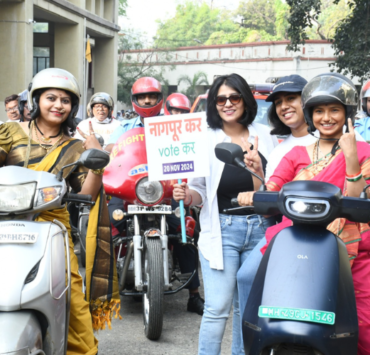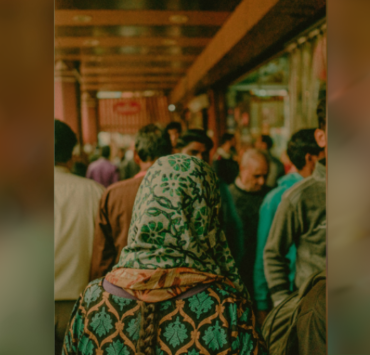
By Jyoti Punwani
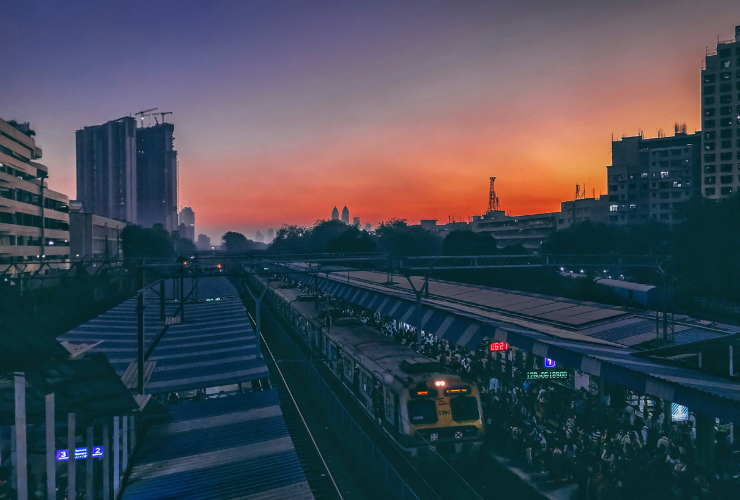
Domestic workers and poor Muslim women in Mumbai knew what they were voting for, but may have to wait longer to see their demands met
Ahead of the Assembly elections in Maharashtra, I met two groups of women voters in Mumbai. Both were completely different, but had one thing in common: while the government had targeted women voters with the Laadki Bahin scheme, it was problems that affected their daily lives that they were most concerned about.
The first group largely comprised domestic workers, whose main demand was a law to regulate the erratic and informal conditions under which they work. Only two Mumbai MLAs had promised to discuss this in the Assembly, said Mangala Bawaskar, a domestic worker and senior member of Prayas, an organisation that has been working with domestic labourers for 20 years. They were: Rituja Latke of Uddhav Thackeray’s Shiv Sena, who lost the election, and BJP’s Sanjay Kelkar, who is back in the House.
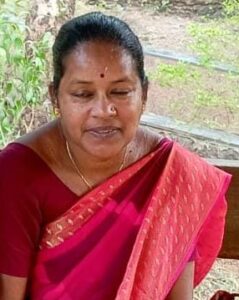
Political apathy towards their long-standing problems was evident in the zero turnout of politicians invited to their convention in March this year. MPs and MLAs had been called in order to pressure the government to set up the tripartite board comprising representatives of domestic workers, employers and the government to deal with their problems, as directed by the Bombay High Court in 2021. “We’d even booked an AC hall,” the women recalled regretfully. Only one MLA, Varsha Gaekwad of the Congress (now an MP), sent her assistant. However, she did meet them later.
The lack of dignity accorded to their work bothered these women as much as their working conditions. They hated being called bai, as is the custom in Mumbai. “Call us by our names; describe us as gharelu kamgars (domestic workers). The tragedy is that what we do is not recognised as work at all,” said Lalita Sarote, a member of the Uddhav Thackeray Sena.
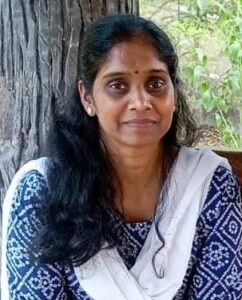
They also resented the discrimination they faced at work in the form of separate utensils and no access to bathrooms. While the older generation may have quietly accepted these humiliations, the younger ones seemed unafraid to confront their employers. “When my employer dropped a bag on my hands, instead of handing it to me, I told her, ‘I clean your kitchen where you cook; I clean the vessels you eat in, yet you consider me unclean’,” recalled Parita Kalal, who recently migrated to Mumbai from Rajasthan.
Working without a minimum wage or fixed hours, being given extra work, wages being withheld, lack of leave and job security are problems they all said they faced. Mangala recounted how she had helped a new member of Prayas recover her dues from an employer who kept delaying payment, and refused to open the door to her. “Since I was at work, I couldn’t rush to her building. I told her to connect me to the watchman,” said Mangala. “I told him to tell the employer that I would call the cops if she didn’t pay up. It worked.”
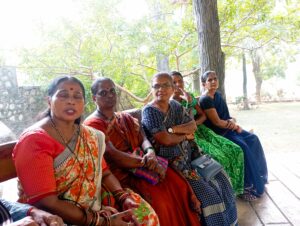
Prayas has been working with employers too, trying to form a joint front to urge the government to provide the workers social security. This year, some employers attended the 8 March programme organized by Prayas and joined the human chain they formed on 16 June, International Domestic Workers Day.
Most of the women expressed appreciation for the Laadki Bahin Yojna, which guaranteed women whose family income was less than Rs 2.5 lakh a year a payment of Rs 1500 a month. They acknowledged that it was an election gimmick yet said they were happy that “the government did what it promised. We got the money.” But that didn’t mean they would vote for the ruling Mahayuti alliance, which comprises the BJP, Shiv Sena and NCP. “We have our own loyalties,” said Lalita. Mangala pointed out that the scheme didn’t compensate for the rise in prices of essential food items and cooking gas. However, the election campaign season had been good for their incomes, they joked—they were paid Rs 300 for every rally they attended, with snacks.
As the conversation turned towards the Shiv Sena split and what the women felt was Uddhav Thackeray’s “betrayal” of Hindutva, the lone Muslim among them spoke up. “I don’t think religion should be used for politics,” said Reshma Shaikh, adding that Muslim domestic workers faced discrimination. Her Muslim friend had had to adopt a Hindu name as employers were unwilling to employ Muslims after the Covid lockdown. While the others listened to her in awkward silence, they enthusiastically joined in when she pointed to the loss of lives over the Babri Masjid-Ram Janmabhoomi issue. “A hospital or an old age home should have been built at that site instead of a temple,” was the majority opinion among these Marathi-speaking Hindu women.
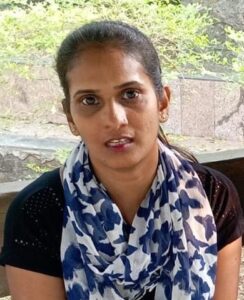
The second encounter was with a group of Muslim housewives in Govandi, a municipal ward that houses Mumbai’s largest landfill and waste treatment plant and has the worst ranking in the human development index in Mumbai. One man has been representing Govandi for the last 15 years: Abu Asim Azmi, the Maharashtra president of the Samajwadi Party (SP).
The dominant feeling across the Muslim-dominated constituency of Mankhurd Shivaji Nagar was that Azmi had to be voted out as he had done nothing to improve living conditions. However, the dilemma voters faced was two-fold: SP was part of the opposition Maha Vikas Alliance, which was the first choice for most of Mumbai’s Muslims, and second, his rivals carried too much baggage. One of them, Nawab Malik, also a veteran MLA, belonged to Ajit Pawar’s NCP, which was a part of the ruling BJP-Shiv Sena-NCP alliance; the other, Ateeque Ahmed Khan, was a young newcomer belonging to the AIMIM.
Though this dilemma was debated across the constituency, for the group of homemakers, it wasn’t too much of an issue. A non-functioning toilet in their locality, a roaring drug mafia resulting in rampant crime, the lack of high schools and a well-equipped hospital were the problems topmost on their minds. Their burning desire was to see the back of Azmi.
They took me to the dilapidated toilet block behind their lane. Thanks to this non-functional toilet, the women said, all residents had, for the last two years, to walk 10 minutes to the next block of toilets. This was extremely difficult for the old and the ill, especially during the three monsoon months. The block was closed at night, and cost them Rs. 3 per use per person, working out to Rs. 30 a day for a family where most are daily wage earners. They’d requested Azmi to get the police to patrol their neighbourhood thrice at night, given the high incidence of drug abuse and knifings. Nothing had come of that request either.
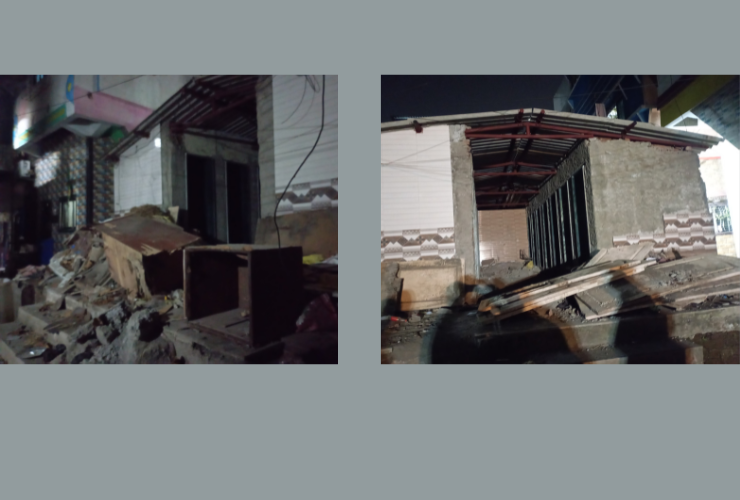
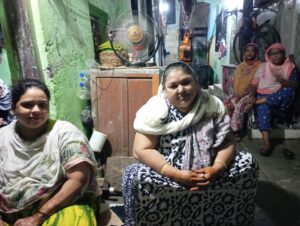
The lack of a public school beyond Class IX within their area meant increased transport costs and sometimes, the extra effort to escort their daughters to and from school. Fed up of all this, they wanted Azmi out, and having seen the way Nawab Malik had changed the neighbouring Muslim colony during his tenure as MLA, as also his easy accessibility, they had decided to vote for him.
Interestingly, his association with the BJP didn’t bother them. “As his voters, we’ll have the leash in our hands. If the BJP wants to bulldoze our masjids, we will stand in front of the bulldozer and make Malik do so too,” they said. One of them pulled out her phone and showed me pictures of Azmi at a felicitation function for a BJP leader. “He’s supposed to be anti-BJP, right?” she said.
Unfortunately, their needs will have to wait for another election cycle. Abu Asim Azmi won the election; Nawab Malik came a distant third.
Jyoti Punwani is a senior journalist based in Mumbai.
Edited by Shalini Umachandran



